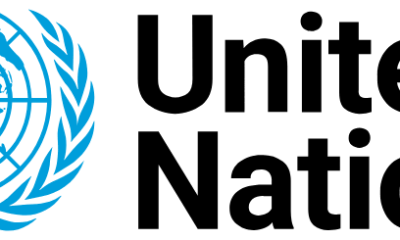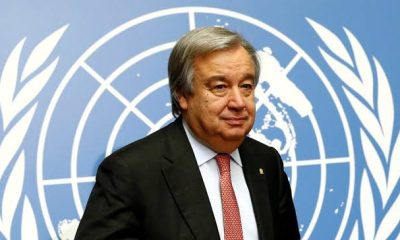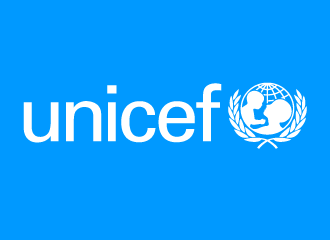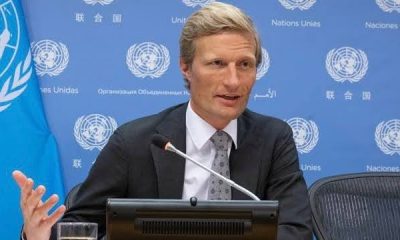Foreign
UN appeals for nuclear test ban amid ‘alarming rise in global mistrust’

United Nations Secretary on General, Antonio Guterres on Tuesday called for more global action to end nuclear testing, warning against the danger of “collective
Guterres made the call in his message to mark the International Day against Nuclear Tests.
The UN chief appealed for key countries to ratify the international treaty that bans experiments for both peaceful and military purposes.
“This year, we face an alarming rise in global mistrust and division,” he said.
“At a time in which nearly 13,000 nuclear weapons are stockpiled around the world — and countries are working to improve their accuracy, reach and destructive power — this is a recipe for annihilation.”
The Comprehensive Nuclear-Test-Ban Treaty (CTBT) therefore represents “a fundamental step in our quest for a world free of nuclear weapons,” he added.
The treaty opened for signature in September 1996 but has yet to enter into force because it must be signed and ratified by 44 specific nuclear technology holder countries, eight of which have yet to ratify it.
The countries are China, Egypt, India, Iran, Israel, the Democratic People’s Republic of Korea, Pakistan and the United States.
“In the name of all victims of nuclear testing, I call on all countries that have not yet ratified the Treaty to do so immediately, without conditions,” Guterres said.
Sinilarly, the President of the UN General Assembly, Csaba Kőrösi, echoed this message during a commemorative event at UN Headquarters in New York.
“Heightened distrust, geopolitical competition and a growing number of armed conflicts have only increased the dangers in our world. Particularly if we consider the regular threats of resorting to a nuclear strike in the on-going war against Ukraine,” he said.
Kőrösi called for “a human-centred approach to disarmament” as investing in nuclear weapons is simply incompatible with global pledges to achieve a more sustainable future for all people and the planet.
He said the CTBT remains “a stark reminder that we have unfinished business” and urged the remaining countries to sign and ratify the treaty.
The General Assembly President also underscored the importance of learning from history “especially at such a moment, fraught with so many dangers.”
He shared the example of a Japanese woman, Teruko Yahata, 85, who was a child when the atomic bomb was dropped on Hiroshima in August 1945, destroying the city. Today, she delivers presentations to people worldwide about the impact of a nuclear blast.
“In the name of all those who suffered from nuclear testing or nuclear detonations, in the name of our loved ones, and the future generations, it is time to prevent global nuclear destruction,” he said.
“It is time to put an end to the threat of our collective suicide.”
The UN High Representative for Disarmament Affairs, Izumi Nakamitsu, also stressed the urgency for action.
Although the CTBT has not entered into force, it remains “a monumental testament” to the global goal of relegating nuclear weapons to history.
“The unilateral moratoria against tests adopted by the nuclear-weapon States are to be commended.
“However, they are no substitute for a legally binding prohibition against all nuclear tests,” she said.
The International Day Against Nuclear Tests has been observed annually on 29 August since 2010.
The date marks the anniversary of the 1991 closure of the Semipalatinsk nuclear test site in Kazakhstan, the largest of its kind in the former Soviet Union, where more than 450 nuclear devices were exploded over four decades.
Foreign
3 teens arrested in Germany for allegedly plotting terror attack
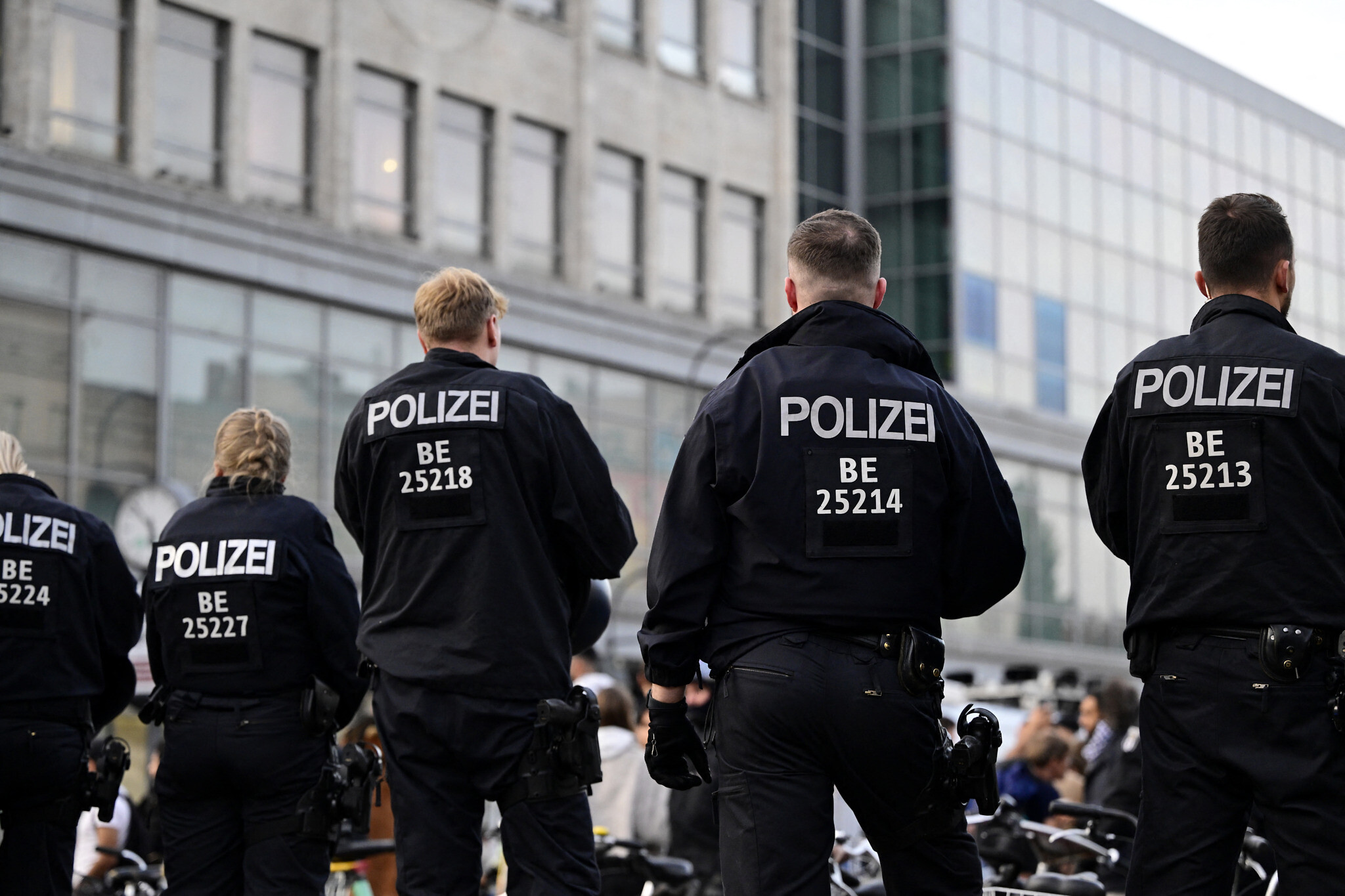
German authorities have arrested three teenagers aged 15 and 16 on suspicion of plotting a deadly Islamist terrorist attack in the western German state of North Rhine-Westphalia, prosecutors said on Friday.
The state’s Central Office for the Prosecution of Terrorism (ZenTer NRW) sought an arrest warrant for the teenagers over the Easter holiday.
They were suspected of plotting a terrorist attack in accordance with the aims and ideology of (extremist militia organisation) Islamic State.
The detained suspects are a 15-year-old girl from Dusseldorf, a 16-year-old girl from the Märkischer Kreis district and a 15-year-old boy from the Soest district, located about 100 kilometres to the east of Dusseldorf.
A fourth suspect has reportedly been identified in the south-western German state of Baden-Württemberg, and the local court there has issued an arrest warrant.
According to the investigators, the teenagers are accused of having agreed to commit murder and manslaughter.
This is in conjunction with the preparation of a serious act of violence endangering the state.
The presumption of innocence applied in all stages of the proceedings.
Security sources told newsmen that the young people had formed a chat group, but had not drawn up a concrete attack plan for a particular time and place.
However, sources said the cities of Dortmund, Dusseldorf and Cologne were discussed as targets, and attacks with knives and Molotov cocktails on people in churches or police officers in police stations had been considered.
The sources said authorities had also conducted searches as part of the investigation.
A machete and a dagger were seized in Dusseldorf, but no evidence of the construction of incendiary devices was discovered.
Sources said the father of the Dusseldorf suspect had already attracted attention from authorities in the past because he had allegedly collected donations for the Islamic State.
The investigators declined to reveal how the suspected terrorists were tracked down, but said that foreign intelligence agencies “did not play a role.”
Foreign
Putin Registers As Candidate For Russia’s Next Presidential Election
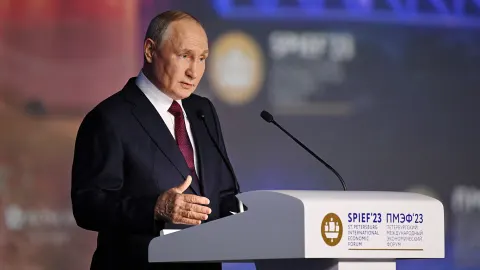
Russia on Monday officially recognised Vladimir Putin as a candidate for the presidential elections in March, a vote that he is all but certain to win.
The 71-year-old has led Russia since the turn of the century, winning four presidential ballots and briefly serving as prime minister in a system where opposition has become virtually non-existent.
The Central Election Commission said it had registered Putin, who nominated himself, as well as right-wing firebrand and Putin-loyalist Leonid Slutsky as candidates for the vote.
The election will be held over a three-day period from March 15 to 17, a move that Kremlin critics have argued makes guaranteeing transparency more difficult.
Following a controversial constitutional reform in 2020, Putin could stay in power until at least 2036.
Rights groups say that previous elections have been marred by irregularities and that independent observers are likely to be barred from monitoring the vote.
While Putin is not expected to face any real competition, liberal challenger Boris Nadezhdin has passed the threshold of signatures to be registered as a candidate.
However, it is still unclear if he will be allowed to run, and the Kremlin has said it does not consider him to be a serious rival.



